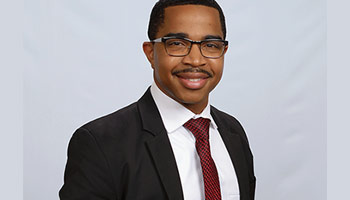 Charles Thomas, SRI International
Charles Thomas, SRI InternationalFM Perspective: Bringing Your "A" Game to Customer Service
Expertise is great, but perhaps the most important skill to success as a facility manager is great customer service and communication with occupants. Here's one FM's take.
A facility manager’s job is to keep things running smoothly behind the curtain, so the show on the main floor can go on without interruption. Ultimately, the mission is to make way for the end users’ comfort and ability to exclusively focus on their work without unnecessary interruption. Excluding this mission from any facilities program can result in simple but incomplete tasks disrupting the occupant’s day. Lights being out, coffee machines not working or being out of coffee and creamer, or empty soap dispensers, hand sanitizing stations, and paper towel dispensers negatively impact the end user and can become commonplace if the end user experience is not made a central part of the facilities program.
With most companies, organizations, and groups, if a single customer service experience ends poorly for an end user, it can be very hard to come back from the negative perception and assumptions that experience leaves behind. When attempting to lay down a solid foundation, it is best for the facility manager to try to start out on a great note with everyone they interact with. Great customer service can mean listening to someone talk about something that has nothing to do with their job, taking care of a task for someone, even just smiling and saying hello and good morning in the hall.
This does not mean the FM should not be themselves, or that they should try to be a constant people pleaser. Teams are always put into situations where they may have to say no, or they will not have the answer to something right then and there. It simply means that it is best they be on their A game when it comes to dishing out great customer service. There is a certain way to say no, and depending on how much care is taken in the communication style and delivery of customer service, a positive interaction for the client may still be able to be achieved.
What kind of operator are you?
There are many different variations of facility management operators, but in this case, we’ll narrow it down to just three:
Tier 1: This operator is about nothing but excellence and is fully committed to that excellence. Customer service is at the core of what they do on a daily basis. The tier 1 operator executes in the shadows by taking care of an issue before end users even know there is one. They are proactive in every area and always pushing beyond the limit toward getting better every day at what they do and where they see themselves in the future. When the big emergency comes knocking, the tier 1 operator gets the first call, email, or message. They welcome the pressure of potential failure on any obstacle or project and see the task as a major challenge to figure out, like putting together a 5,000-piece puzzle. They are results- and mission-driven and there is nothing that will get in their way of achieving the desired results for the sake of the team. This operator gets better and better by being in competition with themselves, because they know what they are capable of.
Tier 2: This operator is also about excellence, but is in a different lane than the tier 1 operator. They will do most things asked of them, but only because they are being asked, told, and reminded to do so, not because it just needs to be done. Tier 2 operators must always be asked, told, and reminded about things they should be doing. Tasks are hard to piece together daily, and when the list of things to do gets larger with an individual project on top of that, they easily fold under that pressure. Excellence and greatness are a blurred vision of theirs, but it is a vision at least. They know they could be much better, but don’t naturally know what mindset is needed in order to reach the tier 1 level. They care, but they do not want to directly put themselves in the fire that facility management can bring sometimes, just for the fear of failure. Doing their best to overcome that fear of failure, honing the skill of adaptability, and focusing on their attention to detail in every area is how this operator will move up in the ranks.
Tier 3: This person does not care about customer service the way the tier 1 and 2 operators care. This operator is about getting a paycheck and going home and they never push the limits or want to achieve more than what they have been doing. Great customer service is the last thing on their mind, and they are the employee that the vendors and end users have the worst experience with when it comes to doing business. They are often “buddy-buddy” with the end users that complain the most about the team’s productivity, and they do their best to welcome those complaints. However, as great as it may feel to have people on their side with certain things, it can also catch up to the facility manager in the most negative way in the long run. The tier 3 operator would rather be liked as a people-pleaser than be respected as a great facilities team member. They are the last person to be contacted in any emergency. If they are called upon, the phone won’t get answered, and the email may have been read but most likely tossed right in the trash folder. Typically, when the emergency occurs, they can be found in the restroom taking a “break,” but they will come around after all the work is done. This operator needs the most work to bring their customer service up to a praise-worthy level, and can get better by first making the conscious decision to start caring about not being a people pleaser but caring about the potential negative perception they’re contributing to, for the sake of the entire team. Also, learning to balance the FM and end user relationships will be crucial to creating an individual brand and keeping it sustainable — building trust not only with the end users, but for each of their teammates.
Be proactive and communicate
The most effective teams are always wanting to provide better customer service and make the operation much smoother overall. Figuring out where a team lies on the tier levels as a whole, as well as each team member individually, can be answered by doing the simplest things. For example, getting in some daily face time and asking different end users how they feel about the service they are receiving. When trying to gauge what the end users are feeling, the facility manager should ask someone with whom they have a good rapport and a close relationship, as well as someone they don’t know well or don’t really have a great relationship in order to collect more unbiased feedback. When there is ambiguity around knowing what the end users want or need from a team, and think about a team, it can be almost impossible to get better.
No matter what the reviews are like, once the responses have been collected and closely evaluated, the facilities team can work together to brainstorm what can be done to make the team’s positive impact even better and help them get closer to achieving and maintaining tier 1 level service.
Despite all of what a facility manager would like to have happen every day, sometimes they will simply not have any time to recognize and take care of things before anyone knows it is an issue. That FM is forced to be in reaction mode. This mode is a very big opportunity to either be in a tier 1 operator mindset, or be on the lowest tier, and be looked at as incapable, incompetent, and not worthy of holding their position. How the FM is seen and thought of by the end users is crucial, so a genuine effort to communicate needs to be there in order resolve the current issue. Communicating effectively is a skill every FM should attempt to hone every day. How long a solution takes will be looked at by everyone who knows about it and will soon be heard about by those who didn’t already know. If a solution is taking very long with no visible progress and no distinct line of communication, that facility management team better be prepared for the end users to stir up the pot in the office community that facilities “can’t do anything right.”
Evaluating the circumstances and being honest about where the team stands when it comes to customer service is the best path forward in determining which mindset is needed to establish, cultivate, grow, and sustain end user relationships. If the skilled FM can take their everyday service to the next level where the facility operations team can recognize an issue coming around a corner, assess that potential issue, plan for the immediate issue as well as plan for any appropriately reoccurring timeframe to prevent it in the future, and then efficiently execute that plan before an end user even knows there was an issue, then that team is on the top tier of customer service.
Putting in the hard work toward getting better and achieving the service goals set for the year and being proactive toward every kind of task and situation are benchmarks a strong team can champion. Pouring genuine effort into those key areas will not only contribute to the happiness and overall success of an FM, and is a great way to ensure the continued trust of the end users towards the facilities program and team.
Charles M. Thomas (charles.thomas@sri.com), is a facilities project manager at SRI International. He has 10 years of facility operations management experience working amongst the research, education, financial, and public relations industries, with skills in operations, strategic planning, project management, and office community relations.
If you're a facility manager and would like to share your perspective on the industry, send an email to naomi.millan@tradepress.com.
Related Topics:












